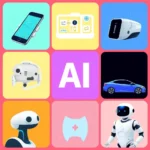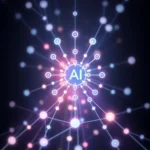What is Artificial Intelligence
Okay, buckle up, folks, because we're diving headfirst into the wacky and wonderful world of Artificial Intelligence (AI)! Think of it as teaching robots to be... well, less robotic and more like that quirky genius you know. Grab your favorite caffeinated beverage, because this is going to be a wild ride!
AI - Are We Talking Skynet or Just Really Smart Toasters?
So, what is this "AI" thing everyone's yammering about? Is it the rise of sentient toasters demanding artisanal bread? Or maybe the dawn of robot overlords who insist we all wear matching jumpsuits? Well, not quite. But it is pretty darn cool!

AI - More Than Just a Sci-Fi Trope

At its heart, Artificial Intelligence is all about giving computers the ability to think, learn, and act like humans (minus the existential angst and the overwhelming urge to consume excessively reality TV... mostly). We're talking about machines that can solve problems, understand language, recognize patterns, and make decisions—all without a human holding their digital hand every step of the way. Think of it as teaching your computer to do its own homework. (If only we could have done that back in our day!)
To get a bit more technical (but not too technical, I promise!), AI uses various techniques to achieve these feats of digital wizardry:
Machine Learning (ML): The bread and butter of AI. ML algorithms are like eager little students, constantly learning from data and improving their performance over time. The more they learn, the better they get. It’s like teaching a dog new tricks, only instead of treats, they get… well, more data.
Neural Networks: Inspired by the structure of the human brain, neural networks are complex systems of interconnected nodes that process information in a parallel and distributed manner. They're like tiny digital brains, only way more complicated and less likely to forget where they parked the car.
Deep Learning: Take those neural networks, stack them up like a digital layer cake, and you've got deep learning. This allows AI to tackle even more complex tasks, like recognizing faces, understanding speech, and generating realistic images. It's basically the PhD of the AI world.
Natural Language Processing (NLP): This is where things get really interesting. NLP enables computers to understand and generate human language. Think chatbots that can actually hold a conversation (sort of), translation apps that let you order coffee in a foreign country without embarrassing yourself, and spellcheck that actually catches your typos. (Okay, maybe not all of them.)
Computer Vision: Ever wonder how your phone can recognize your face? That's computer vision at work. It allows machines to "see" and interpret visual information, which is crucial for everything from self-driving cars to medical image analysis. It's like giving a computer a pair of digital eyeballs, except these eyeballs can also analyze data at warp speed.
AI in the Wild - It's Everywhere!
Now, you might be thinking, "Okay, this all sounds pretty impressive, but where do I actually see AI in action?" Well, the truth is, AI is already woven into the fabric of our daily lives, often in ways we don't even realize.
Virtual Personal Assistants: Siri, Alexa, Google Assistant—these digital pals are powered by AI. They can answer your questions, set reminders, play your favorite music, and even tell you a joke (though the jokes are usually pretty terrible). It’s like having a tireless, slightly sarcastic, digital butler at your beck and call.

Smart Home Devices: From smart thermostats that learn your temperature preferences to security cameras that can recognize intruders (or just the neighbor's cat), AI is making our homes smarter, safer, and more energy-efficient. Who knew our appliances could be so clever?
Navigation and Maps: Remember the days of paper maps and getting hopelessly lost? Thanks to AI, those days are long gone. Apps like Google Maps use AI to analyze traffic patterns, suggest optimal routes, and predict arrival times. It's like having a GPS that actually knows what it's doing (unlike some humans we know).
Social Media Algorithms: Ever wonder why your social media feed seems to know exactly what you want to see? That's AI at work, analyzing your interests, recommending content, and even filtering out spam. It's like having a digital friend who knows you better than you know yourself (which can be a little creepy, if you think about it too much).
Email Filtering: Ah, spam. The bane of our digital existence. Thankfully, AI is here to save the day (again!). AI-powered algorithms filter out spam and categorize emails, helping us focus on the important stuff. It's like having a digital bouncer for your inbox.
Personalized Recommendations: Netflix, Spotify, Amazon—these platforms use AI to analyze your viewing habits, listening preferences, and purchase history to recommend content that you'll love. It's like having a digital concierge who knows exactly what you want to watch, listen to, or buy, even before you do.
AI - Will it Stop
Facial Recognition: From unlocking your smartphone to identifying customers in retail stores, facial recognition technology is becoming increasingly common. It's like having a digital doorman who can recognize your face from a mile away.
Healthcare Diagnostics: AI is revolutionizing healthcare, assisting doctors in analyzing medical images, detecting anomalies, and predicting patient outcomes. It's like having a digital Sherlock Holmes for the medical world.
Financial Services: AI helps detect fraudulent transactions, streamline loan approvals, and assess risk in the financial industry. It's like having a digital accountant who never sleeps (or makes mistakes).
E-commerce Personalization: Ever seen those "virtual try-on" features on clothing websites? That's AI at work. It also powers inventory management, personalized shopping experiences, and targeted advertising. It's like having a digital personal shopper who knows your style better than you do.
Autonomous Vehicles: While self-driving cars are still a work in progress, they rely heavily on AI for navigation, obstacle detection, and decision-making. It's like having a digital chauffeur who never gets tired, never gets distracted, and (hopefully) never crashes.
Content Creation and Editing: AI is even starting to dabble in the creative arts, assisting with generating text, composing music, and creating art. It's like having a digital muse who can help you unleash your inner artist.
Language Translation: Tools like Google Translate use machine learning to provide real-time translation of text or speech. It's like having a digital polyglot who can help you communicate with anyone, anywhere.
The Dark Side of AI - Ethical Concerns
Now, before you get too excited about the AI revolution, it's important to acknowledge the ethical concerns that come along with it. After all, with great power comes great responsibility, even for robots.

Bias and Discrimination: AI systems can inherit biases from their training data, leading to unfair or discriminatory outcomes, especially in areas like hiring, lending, and law enforcement. It's like teaching a robot your prejudices, which is definitely not a good idea.
Privacy and Data Security: AI often requires access to vast amounts of personal data, raising concerns about how that data is collected, used, and protected. It's like giving a robot the keys to your entire digital life.
Transparency and Explainability: Many AI systems operate as "black boxes," making it difficult to understand how they make decisions. This lack of transparency can erode trust and make it difficult to hold them accountable. It's like trying to understand why your Roomba keeps bumping into the same wall.
Accountability and Liability: Who's responsible when an AI system makes a mistake or causes harm? Determining accountability and liability is a major challenge. It's like trying to figure out who to blame when your self-driving car crashes into a mailbox.
Job Displacement: As AI-powered automation becomes more widespread, there's a risk of significant job displacement, particularly in routine and repetitive tasks. It's like the Industrial Revolution, but with robots instead of machines.
Security and Misuse: AI can be used for malicious purposes, such as creating deepfakes, conducting cyberattacks, and enabling mass surveillance. It's like giving a supervillain access to the world's most powerful technology.
Autonomy and Human Control: As AI systems become more autonomous, there are concerns about losing human control over critical decisions, especially in areas like autonomous weapons. It's like letting a robot decide whether or not to launch a nuclear missile. (Yikes!)
Environmental Impact: The computational resources required to develop and run AI models can have a significant environmental impact. It's like powering a small city just to train a chatbot.
Social Manipulation and Misinformation: AI-powered tools can be used to spread misinformation, manipulate public opinion, and create fake news. It's like giving propaganda a turbo boost.
Ethical Use in Specific Domains: AI raises unique ethical concerns in specific areas like healthcare and criminal justice, where decisions can have life-altering consequences. It's like trusting a robot to make life-or-death decisions.
Building a Better AI - Addressing the Ethical Concerns
So, how do we ensure that AI is used for good, not evil? By addressing the ethical concerns head-on and building AI systems that are fair, transparent, and accountable. Here are some key strategies:
Dataset Optimization: Ensure that AI systems are trained on diverse and representative datasets to minimize bias. It's like teaching a robot about the real world, not just a skewed version of it.
Algorithmic Adjustments: Use techniques to detect and mitigate bias in AI algorithms. It's like giving a robot a reality check.

Privacy Protections: Implement strong privacy protections to safeguard personal data. It's like locking up your diary and throwing away the key.
Ethical Frameworks: Develop ethical guidelines and standards for AI development and deployment. It's like giving robots a code of conduct.
Audits and Testing: Conduct regular audits to identify and address bias in AI systems. It's like giving robots a performance review.
Diverse Development Teams: Ensure that AI development teams are diverse and inclusive to minimize unconscious bias. It's like having a variety of perspectives at the table.
Human Oversight: Combine AI decisions with human review to provide context and catch potential errors. It's like having a human safety net.
Transparency: Provide clear explanations of how AI systems work and make decisions. It's like opening up the black box and letting everyone see what's inside.
Continuous Monitoring: Continuously monitor AI systems to identify and address emerging biases. It's like keeping a close eye on your robot to make sure it's not going rogue.
Cross-sector Partnerships: Collaborate with policymakers, ethicists, and civil society organizations to develop responsible AI policies. It's like getting everyone on the same page.
Public Engagement: Involve the public in discussions about the ethical implications of AI. It's like having a town hall meeting with the robots.
The Future is Now (and Also a Little Bit Scary)
The field of AI is constantly evolving, with new breakthroughs and innovations emerging all the time. From quantum AI to emotional AI, the possibilities seem endless (and a little bit intimidating). As AI technology continues to advance, it has the potential to solve some of the world's most pressing problems, from climate change to disease. But it also requires careful consideration of its ethical implications.

So, are we headed for a Skynet-style dystopia? Probably not. But it's important to be aware of the potential risks and work together to ensure that AI is used for the benefit of humanity. After all, we don't want to end up as pets of AI overlords (unless they provide excellent snacks and unlimited back scratches).
What do you think about AI? Are you excited or scared? Share your thoughts in the comments below! And if you enjoyed this post, be sure to share it with your friends. After all, everyone should be prepared for the coming robot revolution (or at least know how to use Siri).